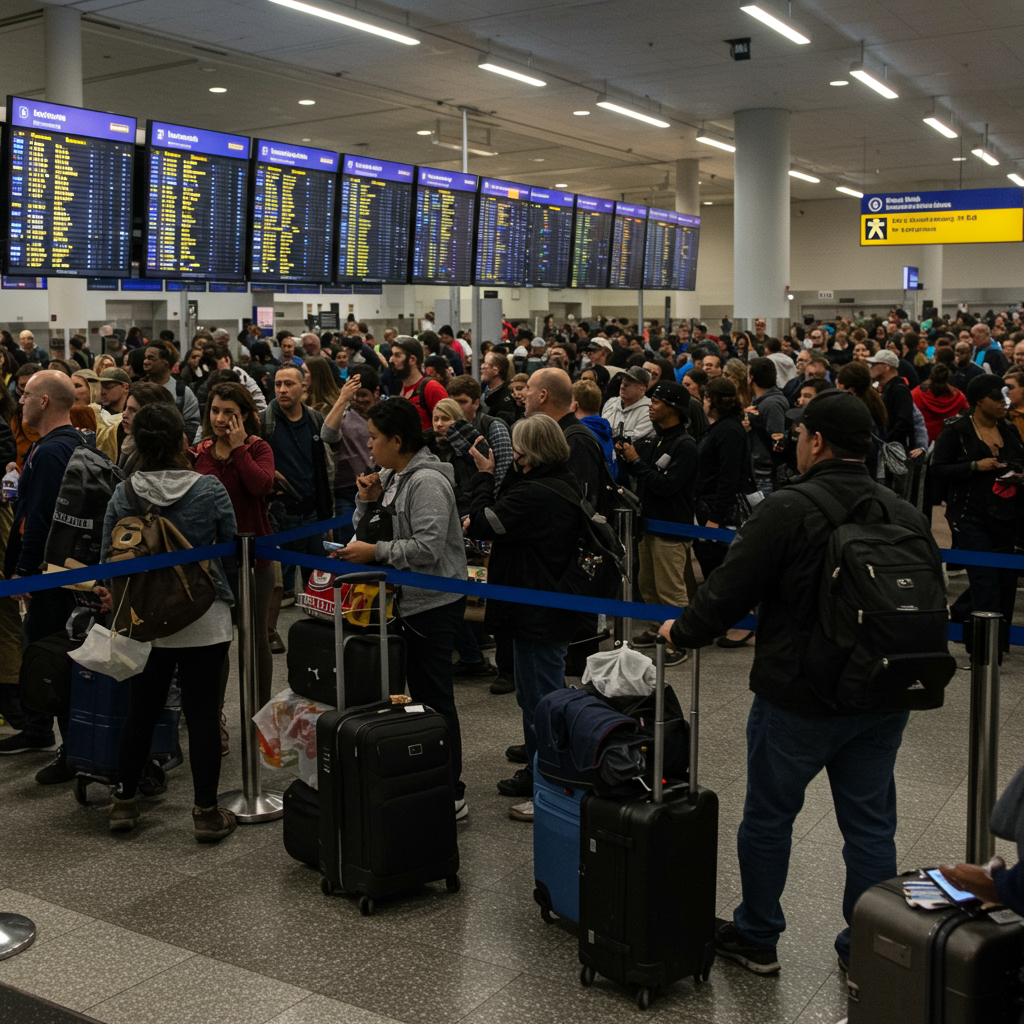Travelers moving through Hartsfield-Jackson Atlanta International airport (ATL) this weekend are facing significant disruptions. Following intense severe weather that struck the metro Atlanta area Friday, June 27th, hundreds of flights have been delayed or canceled. Airlines, primarily delta Air Lines, are working to recover operations, but the impacts are expected to linger through Saturday, June 28th, and potentially into Sunday. Passengers are urged to check their flight status frequently and prepare for potential changes. This unprecedented disruption occurred during one of the busiest travel periods leading into the Fourth of July holiday.
Severe Weather Unleashes Chaos at Hartsfield-Jackson
Friday evening’s storms were exceptionally powerful. They brought a dangerous mix of thunderstorms, vivid lightning, and strong, damaging winds. Quarter-inch sized hail also impacted the airport area. The intensity of the weather quickly overwhelmed normal airport operations. Safety became the top priority, forcing immediate pauses in ground activities. The conditions were so severe that they even necessitated a temporary evacuation of most air traffic controllers from the main tower. A minimal crew remained to guide incoming aircraft, but overall capacity was severely limited. This combination of factors created a bottleneck that rippled throughout the nation’s busiest airport. Flight diversions became necessary, sending over 90 planes bound for Atlanta to land at other airports across the Southeast US.
Widespread Cancellations and Delays Grip ATL
The fallout from the storm became painfully clear on Saturday. By late afternoon, data from flight tracking services confirmed the extent of the problem. Hartsfield-Jackson saw nearly 500 flights canceled. Hundreds more flights experienced significant delays. Specifically, reports indicated around 496 cancellations and approximately 790 delays by Saturday evening. The vast majority of these affected flights were operated by Delta Air Lines. As Atlanta serves as Delta’s primary global hub, any major disruption here has a massive network effect. Thousands of travelers found themselves stranded. Many faced overnight stays at the airport due as nearby hotels quickly booked up. The initial cancellations on Friday left many travelers without immediate options or clear information.
Recovering from Storm Damage and Operational Hurdles
Airline recovery efforts began immediately but faced significant challenges. The storms didn’t just halt operations; they caused physical damage. Delta reported that about 100 of its aircraft on the ground were struck by hail. These planes required thorough inspections throughout Friday night and into Saturday morning. While most were cleared to return to service by Saturday, the inspection process itself caused delays. Severe winds also played a role, contributing to the control tower evacuation, which further complicated the flow of air traffic.
Beyond physical issues, airlines must also manage complex logistics. Repositioning aircraft and ensuring flight crews meet mandatory rest requirements are critical steps. These tasks take time and contribute to cascading delays and cancellations. Delta acknowledged the severe inconvenience for its customers. Erik Snell, Delta’s Chief Customer Experience Officer, issued an apology, stating that the airline’s vast workforce of 100,000 employees was focused on restoring reliability. Personnel are working “as safely and quickly as possible” to stabilize the schedule.
What Travelers Need to Know Now
For passengers currently at Hartsfield-Jackson or planning to travel through ATL this weekend, staying informed is vital. Airlines strongly advise using their official mobile applications for the most current flight status information. These apps are often updated faster than airport display boards or third-party websites. Checking the Federal Aviation Administration’s (FAA) airspace status page can also provide insight into broader air traffic conditions affecting the airport.
If your flight is significantly delayed or canceled, understand your rights and the airline’s policies. Delta, for instance, has indicated it is offering reimbursement for reasonable expenses incurred due to the disruption. This can include costs for hotel accommodations, meals, and alternate transportation. Don’t hesitate to inquire about rebooking options. Be prepared for potentially long wait times when contacting customer service by phone or speaking with airport staff. Exploring alternative travel arrangements, if feasible, might also be necessary for some.
Potential for Continued Weekend Impacts
The weather forecast for the remainder of the weekend suggests that the risk isn’t entirely over. Meteorologists indicate that thunderstorms could persist in the Atlanta area, particularly during the afternoon and evening hours on Saturday and Sunday. This means further weather-related disruptions remain a possibility. Airlines and airport officials will continue monitoring conditions closely. Travelers with flights later in the weekend should monitor forecasts and airline communications proactively. The extensive delays and cancellations experienced on Friday and Saturday highlight how sensitive air travel is to severe weather events, especially at major hubs during peak periods. Recovering a complex flight network after such a significant impact is a multi-day process.
Frequently Asked Questions
What caused the severe flight disruptions at Hartsfield-Jackson Airport?
The primary cause was intense severe weather on Friday, June 27th. Storms brought strong winds, lightning, and hail directly to the airport. This weather forced safety ground stops, led to a temporary evacuation of air traffic controllers from the tower, and required airlines like Delta to inspect over 100 aircraft for potential hail damage, significantly impacting operations and causing widespread delays and cancellations throughout the weekend.
How can travelers get the latest updates on flights at Atlanta Airport?
Airlines recommend using their official mobile apps for the most up-to-date flight status information. For Delta passengers, the Fly Delta app is the recommended tool. Travelers can also monitor the Federal Aviation Administration’s (FAA) airspace status page for general airport conditions and track specific flights using flight tracking websites or apps. Checking the airline’s website is also a reliable source.
What assistance is Delta offering to passengers affected by the weekend disruptions?
Delta Air Lines has stated that it is working to recover its operations and is offering assistance to passengers impacted by the severe weather-related delays and cancellations. This includes providing reimbursement for reasonable expenses incurred, such as hotel stays, meals, and alternate transportation. Passengers with disrupted travel plans should contact Delta directly through their app or customer service channels to explore rebooking options and understand available compensation.
The severe weather event at Hartsfield-Jackson Atlanta International Airport on Friday led to substantial flight disruptions continuing through the weekend. Hundreds of cancellations and significant delays, largely affecting Delta, stemmed from the storm’s intensity, including hail damage and operational halts. Recovery efforts are ongoing, but travelers should remain vigilant, utilize airline resources for updates, and be prepared for potential further weather impacts.




